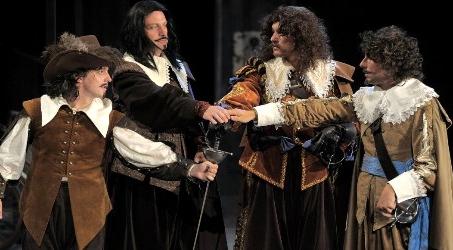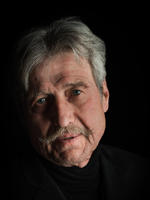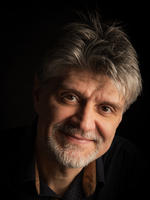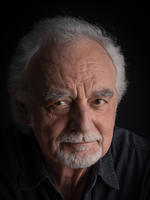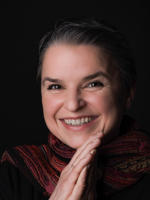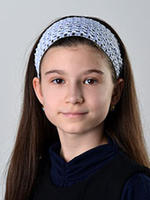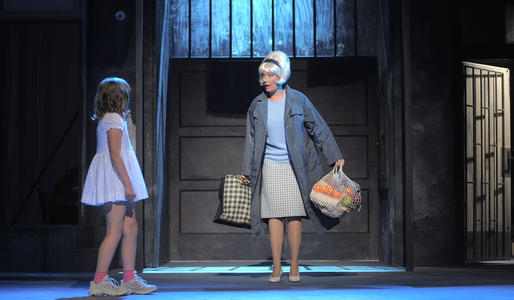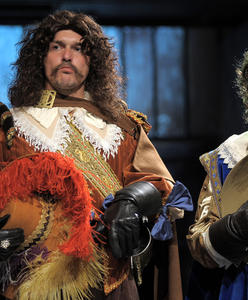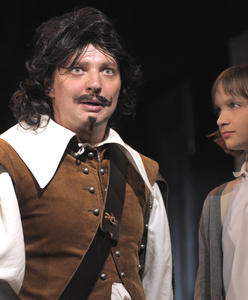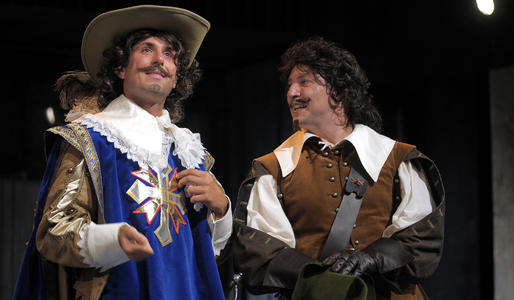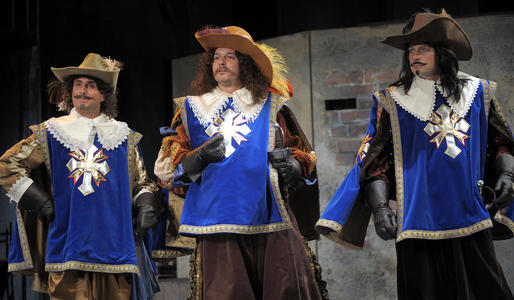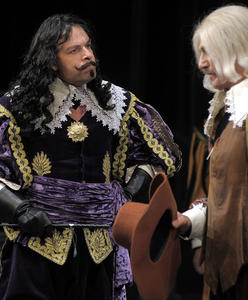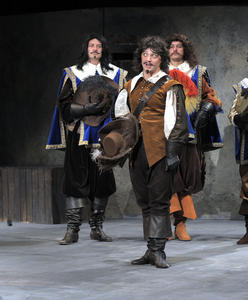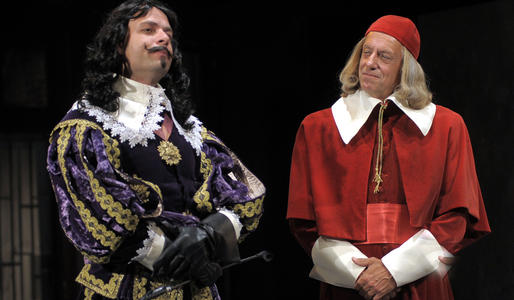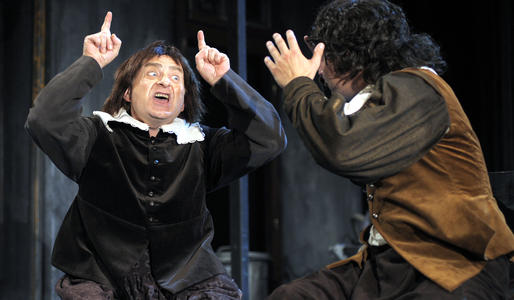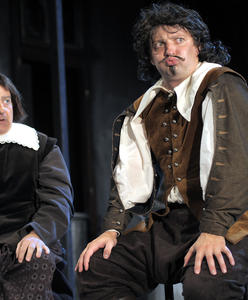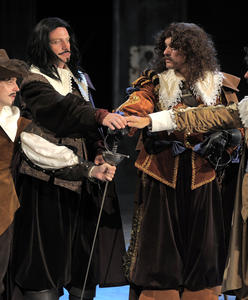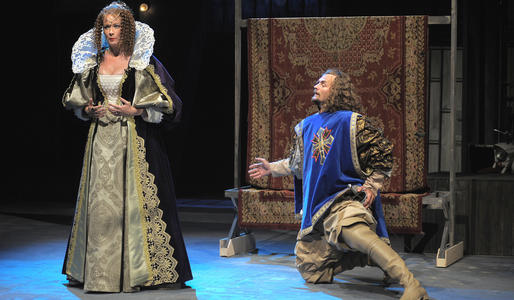The Three Musketeers then, yesterday, today
Zdeněk Hořínek 15. October 2009 zdroj Divadelní noviny
Alexander Dumas' novel The Three Musketeers has had many theatre and film adaptations. The director Hana Burešová has navigated through these murky waters to find a clearly personal approach to this tried-and-tested material. Together with the dramaturgist Štěpán Otčenášek, she has prepared a new dramatization in which the classic topic is connected with experiences from the author's youth, setting it in 1968, shortly after the Soviet occupation. A confrontation based on contrasts and parallels became the fundamental production principle.
The plot of the romantic story from the 17th century is set in a shabby apartment house with a large courtyard equipped with a carpet beating frame and rubbish bins, with a long communal balcony (designer David Marek), where you can see both the tenants dressed in grey and the musketeers in bright costumes (artist Samiha Maleh), inspired by the unforgettable paintings of Maurice Leloir. Dumas' story is followed with a pious loyalty to the original, though shortened and faster moving of course. His world is evoked not by description but by actions. It is located in each of the characters in the individual and mass fight scenes, chases, grand drinking sessions, and intrigues both political and of the heart. The modern story takes place in intermittent and abstracted genre moments, the banality and decadence of which sometimes clashes with the aggressive national mottos. The resulting effects of the confrontation are sometimes dramatic (when the musketeers' triumph over the cardinal's intrigue with the queen's brooch takes place in parallel with the Czech hockey victory over the Soviet team: Hooray! You have tanks and we have goals!), sometimes comical (when the fictitious d’Artagnan, who is closely watching over the safety of the unhappy lover Buckingham, stabs a "real" urinating drunkard by mistake), but they are always full of meaning.
The confrontation also takes place in the modern period, where naive childhood with its eternal longing for adventure and romanticism is placed in contrast with the tired and worried adults (including the normalization-conscious broom-wielding house caretaker Smetáková from whom the excellent Eva Jelínková made an alert analogy with the historical intriguers). However, the girls who are pretending to be the musketeers cannot develop a parallel story, and their domain remains that of empathy and understanding. The children as actors are cute, gifted in movement skills, with voices that are not trained and not always strong enough. However, they fulfil the contrasting function and evoke a certain nostalgia in adult spectators, with the required level of emotiveness.
But let's get back to Dumas' story. The three musketeers are, as usual, four and the last one is deservedly the first. Surprisingly, the young Michal Isteník has all that you expect of a romantic hero - enthusiasm, passion, courage and decisiveness, and is never far from exploding into action, but also displays silly harebrainedness and impetuousness, the source of spontaneous comicity. And it is the naivety which is the connecting element between the historic and yet fictitious d’Artagnan and his child admirers. The beginner can compete excellently with the experienced actors - next to noble Athos (Igor Ondříček) with a sad sceptical smile on his face (who can, however, despite his reserve, lose his inhibitions when in the clutches of a wine cellar), or Porthos (Petr Štěpán), who is somewhat stupid in his vanity, and whose sybaritic body needs to be provoked constantly by his more agile companions. Aramis has the least-rounded character. Zdeněk Hrbata characterizes him in the programme as a "genius of changes and appearances" and evaluates him as one of Dumas' best characters. However, the young Jaroslav Matějka didn't get or find enough opportunities for the expression of this complexity. The musketeers are accompanied adequately by their servants (from whom mainly d’Artagnan's Planchet stands out, played by Jan Mazák in a well-established way) and by their canny superior Monsieur de Tréville who is by no means lacking in musketeerish braggadocio or cunning humour the way Josef Jurásek plays him. On the opposite side of the fence, alongside Cardinal Richelieu (Ladislav Kolář), the spectator's attention is grasped by Pavla Vitázková's Milady, who at the end forgets her slimy charm and, caught in a trap, bursts into a spasmodic rage of powerless fury.
And one more, and the last, confrontation. The dramatic events are accompanied exclusively by music from the Beatles. On the one hand, it reminds us of the Beatlemania of the sixties and on the other, it corresponds effectively with the romantic mood of the story with its optimism, touching sentimentality and spontaneous temperament, and it emphasises the individual and collective action on the stage (the organisation of which partially featured the praiseworthy cooperation of Josef Jurásek on the movement side of things).
During the guest performance at Brno City Theatre, the director and dramaturgist showed they weren't happy with just putting on a conventional evocation and illustration of a famous story which hasn't lost its attraction and amusement, and instead lent it emotional topicality with a solid dose of positive idealism via the confrontation of two time lines and mentalities, from the romanticism of youthful dreams and desires, and from the connection of playfulness, merry vitality and humour, which is so much needed these days as an antidote to an overflow of down-to-earth pragmatism.
Brno City Theatre - Alexandre Dumas: The Three Musketeers. Dramatization Hana Burešová and Štěpán Otčenášek (with the use of a translation by Růžena and Jaromír Poch).
Direction Hana Burešová, dramaturgy Štěpán Otčenášek, setting David Marek, costumes Samiha Maleh, movement cooperation Josef Jurásek, music The Beatles. Premiere 13th September 2008.
The Beatles for all, all for the Beatles!
Tomáš Kubart 1. February 2009 zdroj Rozrazil Online
The newest dramatisation of the historical adventure novel by the famous Alexander Dumas appears to be a pleasant mixture of past reality and private experiences in the hands of the inventive director Hana Burešová. The almost notoriously well known story of honour and hot blood, fame and noble intrigues was narrated by the production team via the beautiful translation by Růžena and Jaromír Pochovi. In all circumstances, the queen and her honour need to be protected, and the musketeers serve both the queen and the king. If the helpless one is endangered by that cunning cardinal with a dubious and misty past, steps definitely need to be taken; this is known to everyone.
But what if d’Artagnan is just a small girl, instead of praising him de Tréville cares about whether or not the musketeers are on time for their dinner, and every fight is interrupted by the guardswoman Smetáková who calls the fencers 'bastards'? Is it actually the charming faces of John, Paul, Ringo and George that are hidden behind old Dumas's masks? Let's not be confused by the little girl/ d’Artagnan. The soul of an adult is no different from that of a child; both have similar ideals and are afraid of identical fears. If the cardinal is challenged by a strong Gascon or a little girl with ordinary dreams it doesn’t really matter in the end. The resistance to the "cardinals" of the end of the sixties deserves the same admiration as the heroic deeds of the free-hearted fencers in the labyrinth of court intrigues. The Czech environment of the period of 'normalisation', which is where the production team has set the action, offers a surprising alternative aspect to the basically classical production. Their work turns out not to have been in vain; they manage to achieve a surprising effect via pure theatrical language and modest means, which isn't customary at Brno City Theatre. Their refined work with the decoration can be seen e.g. in the moment when Constance Bonacieux (Eva Jedličková) is hiding, together with d’Artagnan (Michal Isteník) behind a curtain which had earlier been thrown over some railings by a female inhabitant of that building with its communal balcony. And there were several similarly soft and really pleasant details in the play.
It certainly isn't simply a ph-neutral retelling of a historical story. At the beginning the whole concept comes over as somewhat surprising, but definitely not inappropriate with its historical costumes amidst the jungle of the beginnings of 'normalisation'. The jumping between eras also seems rather confusing at first, but as the storyline develops the spectators are able to find their bearings.
During the whole performance the scenery is changed simply by changing the props, which was carried out during blackouts and always accompanied by the unmistakable sound of flushing. The tenement block with its communal balcony is the setting both for the romantic adventures of those friends with their widely differing characters, and for the second thread of the tale, which is a reminiscence from the author's childhood. The three doors on the communal balcony keep opening and shutting: sometimes they are entrances to the tenants' flats, at other times the rooms of guests in a 17th century French inn. The courtyard is filled with the necessary accoutrements in the form of dustbins, washing and an old bicycle.
Evening is depicted by blue lighting; this seems like the right moment to observe that this is maybe the only dramatic use of lighting. Props, evocative of the atmosphere of the tenement's courtyard, are only used once by the main heroes (they also end up in the hands of dustmen), this being when d’Artagnan is hiding from the duchess behind the dustbins. It was a strange intermingling of worlds; it was as if d’Artagnan had escaped via entering a different story. A similar metaphor was the entrance of the dustmen with the revelation of the duchess's secret; whatever the rubbish is, it has to come out through the same gate.
The sun, which once poured pleasant agitation into the veins of the Gascon boy, also seems to have let its rays fall onto the land of Michal Isteník. Although the extreme scenes full of anger and excited shouting were not really his forte, which may have been caused by some momentary, temporary indisposition, his movement style lent a sparky liveliness to the country lad he played. In once certain scene his movements reminded one of the extremely well-known 'spartakiada' mass exercise displays, and his movement talent really shone with the provocative candidness of a child in a scene with horses, which couldn't really be left out from the musketeers' journey to London. They would have taken up rather too much of the stage, and so, with all seriousness, the horses were successfully 'acted'.
Planchet (Jan Mazák) is a cunning servant with a slightly breaking voice, and in his behaviour and visage he reminds one more of the classic faithful servant Igor (for example Doctor Finkelstein in Burton's Nightmare Before Christmas had a servant of that name, for other examples you don't need to look far; just at random Terry Pratchett's Making Money, or Jim Davis's Garfield). Planchet is a smooth-talking, self-seeking type who is entirely focused on the satisfaction of his basic human needs.
The sad hero with a broken heart and unquenchable thirst, Athos (Igor Ondříček), exposes a psyche wounded by love, and sadly reckless. The melancholically sounding carpe diem in his speech disappears only in exceptional circumstances, one of those being the discovery of the true identity of Milady de Winter.
Jovial and boastful Porthos (Petr Štěpán) is reminiscent of Gérard Depardieu's Obelix, though he has his brighter moments when his clear intelligence and fox-like cunning are employed. A quiet mountain of meat and fat, who allows nothing to spoil his mood and is capable of putting his life on the line for a bit of good food - that's Porthos, a man of thought and chicken.
His comrade in adventure is the discreet Aramis (Jaroslav Matějka), hiding his loves, wounds and tears behind religious enthusiasm. Melancholy Aramis, whose temperament must be feeling rather beaten down under the weight of his clerical garb, brings a little philosophising into the story, and brings flashes of humanity to the ending sequences, and we recognise a chat over a pint…
The magical idol of d’Artagnan's dreams, a blossoming bud in the putrid garden of her imbecilic partner in the institution of marriage (Zdeněk Bureš), Constance Bonacieux (Eva Jedličková) remains a sweet and unfortunate character in the story. The moving naivety with which her young heart brings her right into the noose of the prepared executioner is in nervous contrast with the cold-blooded and calculating nature of young Milady de Winter (Pavla Vitázková). Or Charlotte Backson, Anne de Breuil, Comtesse de la Fére, Lady Clarick? They are all without a doubt, divas of crooked character, reminiscent of Sue's novels (they are definitely a slight tribute to them), walking hand in hand with Pavla Vitázková along a complex pathway filled with emotion. The goblin which is hiding inside her, and cries out in agony before the execution that is supposed to end the problems of many with one stroke, is able to artfully hide itself behind a mask-like smile and girlish 'cuteness'. A completely different kettle of fish was Mrs. Drahorádová (Irena Konvalinová); an open book of simple-heartedness complemented by pleasantly civil acting, even though she was in the services of the persiflage of the 1970s environment. The Duke of Buckingham (Dušan Vitázek) with his strange and insecure gestures often seems as if he can't keep up appearances as a proud noble.
Viktor Skála oscillated between the King, the Executioner of Lille and Father; in each role he was most self-assured.
The story is introduced appropriately by a voice (Ladislav Lakomý), which at moments seems to change genre from an adventure drama into a documentary programme about the history of Western Europe.
Samiha Maleh's historical costumes, in their balanced colours and harmonic composition bear comparison to the Venetian artistic school of Veronese or Crivelli. Particularly the King and Queen's costumes demonstrate the signs of extremely precise mastery of the costumer's art.
A distinctive aspect of the performance is its music. Together with compositions by the Beatles one can also hear La Marseillaise, which on first listening doesn't completely suit the setting of the 17th century story. La Marseillaise was composed in 1792 by a Captain of the Engineers, Rouget de l’Isle, and on 14th July 1795 it was proclaimed the French national anthem. With a few breaks, for example during the Third Empire and during the Vichy regime, it has remained the anthem till today. With regard to the context of scene XXX however, in which the musketeers hold the fort of St. Gervais at La Rochelle, La Marseillaise acts to subtly emphasise the situation. The Beatles' songs also (surprisingly) functioned in a similar way; La Marseillaise, however, has a completely different tendency to the Beatles' work - its use in situations which concern power, leading to victory, inclines exactly towards our automatic conception of how it should be used. The Beatles' compositions supplement and bring colour, while La Marseillaise carries clear information that it is the anthem of freedom. Their roles in the performance are thus different. The employment of the Beatles makes it known from the beginning that the audience is about to witness something untraditional. The choice of music was made masterfully; the chosen compositions suited every scene (most notable was the scene accompanied by the composition 'Come Together') and die-hard fans of the Fab Four must have been in seventh heaven.
Alexandre Dumas, whose remains were recently moved to the Pantheon in Paris, that subtle mystifier, author of his own aureole, would have surely been proud of Brno's version of his (and Maquet's) work. The armed Gascon is released there into unknown territories with the phrase ''Goddamned!“, the heroes leap into the dangers of combat, and also into laziness (joyfully indulged in by Porthos), losers are allowed victory and the victors permitted to lose. This comedy can be enjoyed in its full glory thanks to the quality translation.
This theatre of passion and sharp reversals can easily tear the spectator away from the hypnosis of everyday life.
Little d’Artagnan, a musketeer in a skirt, leaves her childhood behind her, but not the world of fantasy and resistance. Her comrades in their cowardice desert her in battle (''The Beatles have broken up!''), but this musketeer keeps the same lust for life that they had when they all fought for it side by side.
With a little help from my friends Athos, Porthos and Aramis
Jitka Šotkovská 1. February 2009 zdroj Svět a divadlo No. 2
Brno's audiences are already used to the fact that Hana Burešová's productions at Brno City Theatre are usually dramaturgically exclusive titles which have appeared only a few times on Czech stages before, or sometimes are even shown for the first time there. These are usually texts of a more serious character. The fact that this time she has chosen to put on such a popular and oft-adapted work as Dumas's The Three Musketeers is then quite a great surprise. An even greater surprise for spectators is, however, that when they enter the auditorium they see a neglected house with a communal balcony and that they soon understand from the writing on the wall, such as Dubček! Kubišová! Kryl!, that the action will be taking place at the end of the 1960s. As I have already written in my article about older Brno productions by this director, and as the programme brochures of the theatre keep repeating, Hana Burešová usually tries to capture the spirit and style of the given original exactly. However, she has suddenly decided to change the setting of the idealized and romantic world of Dumas into the atmosphere of a spittle-flecked house made with the most realistic details, such as a broken window pane held together by sellotape, or messages on the walls of the pub, such as: ''Indro, you're an idiot. Indrová.'' Even before the lights go out in the auditorium, one of the inhabitants of the house is already beating carpets in the courtyard and loud conversation can be heard from the pub on the ground floor. Suddenly, d’Artagnan gets thrown out of it in a rich historic costume, followed by the similarly-dressed Rochefort and Milady. And this spittle-flecked pub suddenly becomes a wayside inn in Meung. The whole action is watched by a small girl dressed in the 1960s style who has evidently just returned from school.
Soon afterwards we'll find out that this Girl, who is playing with her friends who are pretending to be Dumas's characters, enables a logical bridging between two periods - the whole story is viewed as if through her eyes, which naturally plant the admired musketeers into a well-known everyday setting (however, it is a question why Ladislav Lakomý sometimes comments on the events in places from a recording when the real narrator is the little Girl). Gradually, we'll also grasp that Hana Burešová has discovered a way to be the most loyal to Dumas by creating, paradoxically, a framework of life in a house with a communal balcony in Prague at the end of the 1960s, and that at the same time she has managed not to create a traditional large-format spectacle which often inevitably tends towards sentimentality and kitsch. The director, together with co-dramaturgist Štěpán Otčenášek is not planning to denigrate the Three Musketeers into a parody or some kind of travesty. However, it is hard to make Dumas more "artistic" - there is nothing to be made deeper and if you deny him his sunny simplicity and straightforwardness, there will be little left of him.
Despite the above situation, the novel has something in it which will probably keep attracting new readers and producers. We'll borrow a name for this "something" from Patrik Ouředník's text about Rostand's Cyrano de Bergerac. What remains attractive for the Czech character in Dumas's text is its panache. That is the ability of the characters to keep form at all cost, to not be afraid of big gestures and pathos, to enjoy life with almost arrogant carelessness and mainly eat, drink, love and fight with heroic joy. And also to almost wastefully sacrifice one's life in pursuit of diamond pendants in order to hide something as ignoble and undignified as infidelity, even if it is of the royal variety. "Now, I won't be able to get out of this for sure. But if I am killed, I'll be killed by a musketeer's hand at least," says d’Artagnan to the Girl immediately at the end of the third act when he manages to offend all of the three musketeers within a short time span, shortly after his arrival in Paris. And due to this panache, the production couldn't omit the scene, which is quite superfluous to the plot, where the musketeers make a bet during the siege of La Rochelle that they will breakfast on the enemy's bastion of St. Gervais so that they may discuss matters.
This panache, however, often has a taste of grandiloquence and vain boastfulness. How can one take it seriously on our stages which try hard to avoid pathos, on stages where it can easily sound embarrassing? Isn't the admiration of the grand, poster-like heroism of the musketeers somewhat childish? Or at least naïve?
Perhaps this is why a child's perspective which longs for heroism seems to be ideal for conveying the spirit of Dumas's text. Clinging to the novel provides an opportunity to escape the daunting soullessness of everyday life with an unpleasant house-keeper behind one's back and a toilet which is shared by all the inhabitants of the floor, the life between a community centre and a pub where the neighbour's Zdeněk constantly keeps repairing his motorbike. On top of that, it is a view of a child who has caught something from the hopes and heroism of the Prague Spring and who has to come to terms with the coming greyness of normalization and has no option but to watch how the written word of 'Freedom!' as well as the names of the heroes of that time slowly fade away from the wall in the courtyard.
The parallel between the 1960s and the story of the "three" musketeers is strengthened on the musical side, which consists of compositions by the Beatles. If we don't consider all of the straightforward associations (that there were four of the Beatles as well as of the musketeers, that they were admired heroes in their time, that they represented similar values of friendship, solidarity and idealism and at the end they all went their own way), the connection between the Beatles and Dumas's text is mainly the carefree, optimistic and passionate atmosphere of their music which can also at other times be nostalgic and lightly sentimental. And so the situation when d’Artagnan joins the musketeers in order to fight with them against the cardinal's men in the rhythm of Twist and Shout, when the fencing suddenly changes into dance choreography, makes a completely organic impression.
Even though the connection of two heterogeneous levels - the childhood of the Girl and the stories of the musketeers - has its rational meaning, they aren't linked to each other by complex intellectual relationships and keys; the 1960s form only a frame for the story and help to create the atmosphere using a lyrical impression. The continuous changing of both contrast levels then also serves to create humorous estrangement and ironizes, very mildly, the straightforward adventurousness of the text. The English texts of the songs have a similar function. When the cardinal's soldiers appear on the stage for the first time, Sgt. Pepper’s Lonely Hearts Club Band is played. When the jealous d’Artagnan watches Constance, he finds out that she is only accompanying Lord Buckingham to the Queen; Buckingham asks d’Artagnan to accompany him and possibly kill anyone who might trail them. Come Together is played, a "real" drunk man staggers out of the pub under the communal balcony in order to relieve himself in the courtyard, and d’Artagnan asks him to turn around so that he doesn't have to stab him from behind. The "killed" drunkard, however, gets up immediately, is surprised at his clumsiness because he wetted his trousers and stumbles back into the pub.
Similar estrangement also takes place via the scenography (David Marek); all action takes place in the courtyard or the adjacent communal balcony, therefore the castle chamber where Buckingham confesses his love to Queen Anna is equipped only with an old Persian carpet which was left by Mr. Drahorád on the carpet beater. Similarly as in his English residence, Buckingham hides a portrait of his beloved Anna behind the door to the community centre, which is currently collecting money for Biafra. The rich historical costumes by Samiha Maleh, as well as the production of certain situations which refer to the classical book illustrations of Dumas's novel by Maurice Leloire, contrast with the scenography. The connection of both planes serves mainly the purpose of comicality, although at the same time it points at the parallels between the atmosphere of the novel and the events in the life of the Girl. The victorious conclusion of the episode with the pendants, when the Queen smartly makes Cardinal Richelieu feel small, gains a contemporary charge for the girl when it happens exactly at the moment of the hockey victory of Czechoslovakia over Russia in 1969. So while the royal ball is taking place in the courtyard, excited neighbours are running along the communal balcony shouting: ''You send us tanks and we send you goals!" etc.
Even though most adaptations of Dumas's The Three Musketeers culminate in the return of the diamond pendants to the Queen, at Brno City Theatre this only marks the end of the first half of the production. Burešová and Otčenášek decided to process both parts of 'the Musketeers' and the whole story concludes with the beheading of Milady and the award of a lieutenant's commission to d'Artagnan. The dramaturgists have built the story epically rather than dramatically and they also leave space for numerous plot diversions which are more important for capturing the atmosphere than for the plot itself. This is true, for example, for the already mentioned breakfast scene at the bastion of St. Gervais or for Aramis's religious debate with representatives of the church.
The spectators will hardly notice that the production is three hours and a half long mainly thanks to the protagonist of the main role of d’Artagnan, Michal Isteník. As far as the type of character is concerned, Isteník doesn't correspond to one's idea of a heroic lover - with his podgy figure, he rather resembles a common Gascon farmer. This countryman comes to Paris with his childhood dream of becoming a royal musketeer and is amazed at everything - it is no wonder that he manages to offend three musketeers almost at the same moment thanks to his naïve clumsiness. Isteník becomes the natural motor of the production because his youthful impetuousness, combined with the passionate courage and decisiveness with which he fights for the interests of his beloved one and her lady, and which drive him forwards all the time. In accordance with the directorial and dramaturgical conception of the production, Isteník's d’Artagnan is perhaps just a childhood dream about a good older brother for the Girl, rather than an adolescent dream of love.
Isteník's feeling for tempo and rhythm combines with the ability to exactly grasp a punch line as well as his good technical ability, helping him put on a very colourful performance as d’Artagnan. The character develops from a young and naïve boy, through an over-confident young nobleman honoured by the King when he presents himself in charming poses and ranks himself above "ordinary Parisians", up to an adult man scarred by the loss of his beloved. Isteník's sense of humour, with which he isn't afraid to "knock down" his hero from time to time, is the main device of his performance.
If we can call Isteník the body of the production, than its spirit is Athos, performed by Igor Ondříček. As in many previous productions, and not only those by Hana Burešová, Igor Onříček shows that he can handle pathos and great gestures, as if the romantic acting style typical of the century before last was second nature to him. His noble behaviour, with deeper streams of sadness and nostalgia which combines with the ability to drink himself through to the bottom of his sorrow, reminds one of the above-mentioned panache the most.
Both of the remaining musketeers are very well-executed genre figures. The always elegant and somewhat egoistical Aramis, played by Jaroslav Matějka, lets himself be carried away by his passion for poetry and beautiful women while Petr Štěpán's Porthos constantly oscillates between sleepy slowness, caused by his uncontrollable liking for good food and drink, and an impulsive mood which makes him ready to attack at any time.
The secondary characters are also created with Dumas-like heroic diction, but also with the help of exactly calibrated distance, whether it be Viktor Skála's spoilt and useless King, Jan Mazák's impertinent Planchet or Dušan Vitázek's love-struck Buckingham, who is capable of the constant ironizing of his almost poster-like masculine appearance. It is a shame that his Czech is marked by a pronounced Slovak accent. On-stage speech, though, is generally a problem for the protagonists of the secondary roles, and not only for the actors of Slovak origin.
The chosen expressive means seem to suit the male part of the ensemble more than the female one. The actresses are undoubtedly charming but they don't seem to have processed the second, constantly slightly estranging plan. Their characters thus come across as somewhat flat. Eva Jedličková's Constance (who is unfortunately betrayed by her not very steady voice) is just a kind, nice girl. Alena Antalová is just an elegant Queen who is trying to resist love outside marriage, and Pavla Vitázková's Milady is a dangerous intriguer. Some of the scenes which were acted without light exaggeration can then evoke somewhat mixed feelings, for example a fit of rage during which Milady wants to stab d’Artagnan because he discovered her burnt lily. Perhaps the best of the female characters is the foolishly naïve Ketty acted by Evelína Kachlířová.
Contrasting with the pathos of the great gestures is the ordinariness of the protagonists of the second story line, who are represented mainly by the unbearable housekeeper Smetáková played by Eva Jelínková and the kind and motherly Mrs. Drahorádová played by Irena Konvalinová. It is the dispute between the chosen expressive means of both of the levels which creates a series of funny situations - which concern, for example, various forms of love, such as when a passionate romantic dialogue takes place between Buckingham and the Queen, who are watched from above by neighbour Vondra in his underpants who is having a smoke. His wife then shouts at him: "Daddy, don't stand there when you are so hot, you'll catch a cold!"
During the whole of the last year, productions drawing from ''that year with an eight at its end'' were created on Czech stages, trying to reflect our modern history. The Three Musketeers at Brno City Theatre is mainly a well-made and clever piece of entertainment which shows one way of dealing with this slightly problematic classical work as far as the artistic production is concerned. One could also view this production as a very subjective, lyricizing memory of the year 1968 and the coming normalization. Similarly as when the Beatles broke up, one adventurous childhood was ended by moving into an apartment block with hot water and its own toilet, accompanied by the end of a period full of idealism.
All quiet on the western (Prague) front?
Vladimír Lust 10. November 2008 zdroj Literární noviny
Something from Dumas...
The very first experience I had this year, prepared for me by the director Hana Burešová and the dramaturgist Štěpán Otčenášek at Brno City Theatre in their authorial (one might like to say Beatles-like) variation on Dumas's Three Musketeers, was one of the strongest ones of all. I went to Brno slightly suspicious because - even though in Celetná or in Ypsilonka, in contrast with monstrous musical kitsch the performances have always been better than average - it hasn't happened to me in half a century that I would have such an experience from a theatre or cinema performance that is comparable to that of reading. Something essential has always been missing, or more and more frequently there was too much of it and it grew parasitically on the material until it killed its poetry. Therefore, I was even more pleasantly surprised in Brno by two seemingly contradictive things. The piece is touchingly pious and strictly loyal to the original, the story and basic situations as well as the dialogues with a slightly archaic set of vocabulary - a translation by Růžena and Jaromír Poch, similarly as with the nearly exact on-stage depiction of Leloir's illustrations, as similarly immortal as Dumas's work. This is combined with the courage to make a strong semantic shift of the trivial to the imaginative, a shift of the piously presented matter into a completely new setting. It is a bleak, plebeian setting of socialist-realism - the director's childhood in a shabby building in Žižkov with a communal balcony, with one toilet in a shared corridor, a carpet beating frame in the courtyard and a pub and community centre downstairs. It is here, in this truly anti-romantic, depressing environment, that the trivial affairs of the musketeers, together with music by the Beatles, becomes poetry, and is enriched by a new, ironic, Dadaistic as well as lyrical dimension because it serves the local pre-adolescent girls as a highly effective compensational myth. And the most precious thing about this all is that it works, that these seemingly incongruous levels - the myths of the musketeers and the Beatles, and also those of socialist-realism are interlinked miraculously and through their mutual clashing create new meaning and wit (the hidden "web of relationships"), as is the case with every great poetic metaphor. D’Artagnan (Michal Isteník is, for me, so far unambiguously the best performer as well as the discovery of the year - he plays his character from the very beginning not as a hero but thoroughly as an outsider) is, rapier in hand, frantically chasing his man of Meung, when he collides with a socialist-realist tenant who is hurrying down the claustrophobic shared corridor towards the toilet; the triumph over cardinal's guardsmen and the happy return of the four heroes from a fight - all this, in the eyes of the girls, cannot be expressed more precisely than through the Beatles' music; love-struck Buckingham (Dušan Vitázek) hides a portrait of his object of desire, Queen Anne of Austria (Alena Antalová) in the community centre; and finally: after d’Artagnan tried in vain to inspire his three friends, who are putting away their musketeer coats, with a fresh order from the lieutenant, the girls state with disappointment the worst possible ending to the story: "So this is the end. The Beatles have split up!" And after hockey euphoria had taken over the building for a while, the definitive, spine-chilling hangover of socialism arrives. Of course, there are many more meanings, links and overlaps in the performance, as well as many acting performances in precise style - on the edge between seriousness and parody (Igor Ondříček's Athos, Petr Štěpán's Porthos, Louis XIII. / The Executioner of Lille / Viktor Skála's Father, Jan Mazák's Planchet, Ladislav Kolář's Cardinal, Pavla Vitázková's Milady, Eva Jedličková's Constance and others).
If Matějka's Aramis just borrows a bit of courage from his friends for an exaggerated and gently parodic portrayal of his character for the repeats, the productions won't have a single weak spot. It is true that each of the actors have to have something of Dumas in them (just as the great romantic storyteller himself had something of a comedian in him): the courage not to perceive situations or events literally, not to let them beat you, not to take them too seriously, but with imagination and almost compulsory irony. The musketeers push themselves as well as their horses to Buckingham not only in order to hide imminent marital infidelity, but also to save the metaphor (the honour of the queen has to be protected from anyone, from gossip as well as from the truth - see the trickery with two additional copies of diamonds). To sum it all up: the last time I have seen such a daring authorial shift of a classical work into new contexts was perhaps in the legendary productions of Alfréd Radok or, if you remain in Moravia, in Hynšt's adaptations of Brecht, Chekhov or Dürrenmatt. Moša's Brno City Theatre is able to, though it doesn't have to, invite Burešová and Otčenášek over from Prague. It deserves thanks for regularly doing so as "added value", as it enriches the whole of Czech culture.
Three, three, three musketeers
Peter Stoličný 28. October 2008 zdroj www.divadlo.sk
Spectators first need to get used to the alienating effect. They can see diametrically different levels: the story of the musketeers as well as of the everyday life in a house with a communal balcony (along with the shared toilet, the hanging of washing and other small tasks which create numerous comic situations). In fact, the whole production is conceived as such a juxtaposition. And why not? Why repeat a romantic tale a thousand times performed? Why not mix in the quite unromantic childhoods of the authors of this dramatization? Namely the things which a little girl, enchanted both by the period in which she lives and the romantic heroic deeds of the musketeers she is reading about, sees on a Prague communal balcony? The transition from one world into the other takes place smoothly and wittily. The humorous perspective on the story helped it a lot.
I also discovered new faces in the production. I have to admit that I hadn't seen Michal Isteník acting at Brno City Theatre before. His d’Artagnan was great, the same as Jaroslav Matějka's Aramis. The fact that Igor Ondříček and Petr Štěpán were acting excellently didn't surprise me. It is a shame that there wasn't more space for Alena Antalová in the role of the Queen or in the role of Mother. But this is the way it is - musketeer stories are about manly deeds; women are in them in order to provoke the men into doing those deeds.
On David Marek's stage and in Samiha Maleh's costumes, everything was well thought-out, all is functional and there is just enough of it. Not too much, not too little. A lovely contrast of those past years of ours with the period Dumas (senior) wrote about. I'm not writing about the years of those political events on purpose because Alexander Dumas didn't worry about some inaccuracies as far as facts about the given period are concerned. Anne of Austria, for example, lived at least thirty years earlier than in Dumas's story. But events that took place a long time ago are not sensitive to exactness, authenticity. Also, the script writers, dramaturgist Štěpán Otčenášek and director Hana Burešová were aware of this as well. They left the musketeer romanticism as well as the facts untouched, and they concentrated all the more on the authenticity of the years of Burešová's youth. The result is greater than expected. Witticism, humour, the gentle stroking of romanticism and the immortal songs of the Beatles - the spectators can find all this in the latest dramatization of the famous historic-adventure novel.
I went to see the premiere of the Three Musketeers (13.9.2008) with doubts in my mind. Well just imagine - Dumas and the Beatles! However, I left the theatre feeling great. Those three (or four) musketeers really helped me get into a good mood. And this is also the purpose of theatre - and quite an essential one.
Both a Smíchov tenement with a communal balcony and the Beatles suit Burešová's Musketeers
Lenka Suchá 13. October 2008 zdroj Brněnský deník
D’Artagnan, Porthos, Aramis, Athos. Who doesn't know the famous heroes of Dumas' Three Musketeers? The newest dramatisation of this historical adventure novel was prepared for the Brno City Theatre as the first premiere of the season by director Hana Burešová.
Some spectators that come to the auditorium to enjoy a romantic story about honour, loyalty and love may get a bit of a shock right at the beginning.
Up on stage, instead of an opulent set featuring the French king's court they will be greeted by the cracked and flaking walls of a Smíchov tenement from the end of the nineteen sixties, complete with communal balcony, and also its distinctive occupants.
Children come running down playing together, often pretending to be characters from the novel. Among them is a little girl - the director's memory of her own childhood. It is she that brings her heroes all the way to her home, and we see the story through her eyes.
Very soon it is clear that the quartet of musketeers in period costume is able to co-exist with the suburb dwellers in "civilian" clothes without any problem at all. The scenes up above on the balcony don't interrupt the flow of the story, and in fact they are used inventively to fill the time when the scenery is being changed. For example, during a crazy night-time chase with an enemy the Gascon noble d’Artagnan (exceptional Michal Isteník) is obstructed by a man in pyjamas who is on his way to relieve himself in the communal toilet, while at a different moment one grandmother on her way to visit her grandchildren is unable to take her eyes off Porthos.
All this is set to the rhythm of the bouncy and immortal hits of the Beatles, music icons of the sixties. Help, I need somebody…
Lovers of the classic novel definitely won't feel short-changed, however. They will be treated to a thrilling spectacle, in which the group around Cardinal Richelieu spin webs of intrigue with the aid of vengeful Milady de Winter and try in vain to get the better of the four courageous musketeers.
Not even romantic confessions of love are missing, nor are exciting fencing duels (excellently managed by the actors).
The main device of Burešová's production still remains the lightness and playfulness with which she has faithfully brought the full length of this historical novel to the stage. She has also with great bravura connected two, at first sight very different worlds: the seventeenth century and the recent past. The Three Musketeers at the Brno City Theatre thus not only offers many spectators nostalgia for the time around 1969, when there was a famous hockey victory over the Soviets as well as queues for mandarin oranges, but also brings the long gone times of the novel to life, times when one's word could be more important than the law, and where one did not need to be embarrassed by loyalty and honour. The first of these times will never return, and the spirit of the second has still hopefully not completely died.
The Musketeers and the Beatles on a communal balcony
David Drozd 3. October 2008 zdroj Lidové noviny
If you love The Three Musketeers in the original book version, do not be scared. The thing we will be talking about has been created by people who love them very much as well, the director Hana Burešová with the dramaturgist Štěpán Otčenášek - who these days seem to have become permanent guests of Brno City Theatre. The first look at the set may be frightening: you will see the relatively realistic courtyard of an old building with a communal balcony. A more observant spectator will recognise the writing on the wall: "Dubček! Kubišová! Kryl!" But what the sixties have in common with Dumas' great work is still a mystery. However, everything will become clear soon. The house lives its everyday life, with many little micro-situations intertwined with the stories of d’Artagnan, as they are read by a ten-year-old girl. Logically, she situates them in the courtyard where she spends so much time with her friends. And the Beatles, who are mentioned in the title, become part of this plan - as time goes by, you get the idea that the Liverpool quartet are another object of keen interest. During the first minutes, the personal approach which Burešová has chosen becomes clear: to talk about how she herself read Dumas on one communal balcony some time around 1969 and listened to the Beatles at the same time. The frame is not ostentatious in any way but enables the director to create a clear standpoint towards the popular work - to express admiration as well as gentle irony, and it is with both of these that we return to this book (how else could our heroes fence to the rhythm of the Beatles, including the occasional impromptu choreographic number).
Burešová is able to change the shabby building into any needed place and those who want to see a great spectacle will be pleased as well: the costumes are as they should be, with all the necessary wigs and hair-pieces, dazzle, feathers and magnificence. Perhaps they are even more beautiful because of the run-down walls ever-present all around them.
Beautiful women, manly men
To speak about acting performances in this case puts the reviewer in the position of necessarily having to impolitely not mention some members of the almost fifty-head ensemble - let's say at least that all the women are beautiful and all the men, including the villains, are appropriately manly. The "real" events in the spittle-flecked courtyard contrast with the pathos and precisely controlled boiling passions of Dumas' story. This contrast between two levels is used by Burešová to conjure up many magical situations, like when Father came with coal from the cellar in which Athos was barricaded, or when the only background for Buckingham's passionate declaration was across a Persian carpet hung on a carpet beating frame where it had just a moment ago been furiously beaten by a neighbour. I don't want to give more away, let yourself be surprised.
In the end, everything is as it should be, or maybe even better, because we can have a good laugh at the same time (the connection between the Beatles' music and the individual situations from the novel is a source of amazing fun) and once again allow ourselves to dream within this story of true heroism. Burešová and Otčenášek's Three Musketeers is more than a cold dramaturgical choice to go for a sure-fire hit based on a popular book - in fact they have gone to great lengths to avoid this approach (for example Burešová chose an older translation in which the gentlemen hail each other in grand old-fashioned style!)
We have before us a modern, intelligent and at the same time entertaining piece of theatre, which is a combination that we haven't been seeing too often recently.
The Brno Musketeers fascinated the audience
Iveta Macková 1. October 2008 zdroj Kult
The theatre dramatization of Dumas' Three Musketeers, performed in the middle of September under the direction of Hana Burešová, became the pilot premiere of this year at Brno City Theatre. The production team led by Burešová has already produced several successes and it's no different this time.
Not many people can imagine how the production conception of The Three Musketeers connects The Beatles and the Musketeers together as they exist within the director's childhood memories. Not to mention that some actors play several roles and change from historical costumes into "civilian" ones. On top of that, spectators' experience of "modernized" classics (which are often cheap and trying to be special or simply works of directorial exhibitionism) is more than plentiful. However, Hana Burešová's product manages to be the opposite - the director, together with her husband Štěpán Otčenášek (both co-authors of the dramatization with the use of J. and R. Poch's translation) approached the novel with complete humility, and also followed its chronology.
The idea to set The Three Musketeers (Dumas' novel takes place between 1625 and1628) in the nineteen seventies (roughly in the years 1969-1970) gives the performance new life and a new kick. The framework of the setting (David Marek) is a view of the courtyard of a house with a communal balcony, perhaps somewhere in Prague's Smíchov district where the director grew up, or maybe in Old Brno or somewhere completely different, but that isn't important. The direction utilizes the "house with communal balcony" completely - it serves the musketeers as well as the nineteen seventies. Acting takes place in the courtyard, in the cellar, on the balconies… Every period has a period costume (Samiha Maleh), the musketeers and the "civilians" often complement each other very wittily. The connection of times more than three centuries apart livens up the atmosphere of both periods indescribably. It can be said that the civilians make the original classic more human and draw it closer to the spectator, and this is where the strength and attraction of the whole production lies.
Similarly, the insertion of the Beatles' music into the middle of the seventeenth century (and vice versa) was without question a daring, but great, deed. The musketeers are fencing on the stage and above them a girl is sitting (a "civilian") and watching them admiringly, and all this is accompanied by the singing and playing of The Beatles. It's as if the Beatles and the Musketeers have always belonged together! The performance doesn't mix anything up or ruin anything. Both periods live their own lives, with elements appropriate to each of them, alongside each other. The Beatles are impressive, the musketeers charming, but each of them in their own way. And they are connected only in a few sequences - when the musketeers are fencing (with the movement cooperation of Josef Jurásek and Tomáš Sagher) to the rhythm of The Beatles, and a few times when they even dance.
The spectators are really amused during the performance, of course also due to the great and most sophisticated acting performance of all the actors, whether it be d’Artagnan or Aramis (Michal Isteník and Jaroslav Matějka, both novices), Porthos (Petr Štěpán), Athos (Igor Ondříček) or the many others, including the children led by Lucie Brázdová. Simply, The Three Musketeers in Lidická Street are certainly worth seeing! The three-hour long Brno production will speak to school children, young people, families with children as well as the older generation.
The Three Musketeers - Brno City Theatre - premiere 13th September 2008.
The musketeers are running through Smíchov
20. September 2008 zdroj MF Dnes
A Smíchov tenement block at the end of the sixties and brisk music by the Beatles form the visual and musical setting of the new production of Dumas' The Three Musketeers at Brno City Theatre, in a version created by the director Hana Burešová.
This bizarre mixture of the most translated French book of all time and an environment which is incongruous as far as the period and setting are concerned may seem hard to digest. However, the opposite is true. The first Brno premiere of the season is a witty, light and most of all thorough translation of the legendary original. A spectator who craves romanticism will get several bonuses here. Burešová has combined two retrospective views, reflecting her own experience as a girl with this thrilling novel. The intentions of the director are simple, although quite a few spectators won't decipher them immediately at the beginning. The brave musketeer trio - in fact, a quartet - enter the shabby courtyard as the sacred literary heroes of an ordinary Prague girl. The uninviting building and the everyday bustle within it form the frame of a thrilling historical drama from the 17th century. Burešová, in tandem with Štěpán Otčenášek, has adapted the original very accurately. She doesn't try to shift the meaning or make the story lighter by use of irony. She amusingly contrasts the grey reality at the end of the sweet "sixties", with the beauty of the court fashion of the Musketeers' time. Other, no less refreshing, parallels arise from the unusual combination of settings. A strongly bonded quartet of friends falls apart at the end, just like the four musketeers of music called the Beatles. Also, the four girl musketeers of Smíchov end up saying goodbye to one another. After all, many friendships and (mainly political) promises irrevocably came to nothing back then… Another great aspect of the evening is the thorough and exact work with motifs which are present at both period levels. The director softly brings back values like human solidarity and friendship, and this is certainly a valuable message in these times when soulless spectacles are craved. Also the humour, which the director bases on the points of connection between periods which are nearly four centuries apart, is wonderful and delicate, for example when the fleeing musketeers have to face an insurmountable obstacle: a tenant shuffling slowly towards the toilet. A chapter in itself is the precise acting, and the almost professional fencing performances of the protagonists are a delicacy. The performance has not become simply a title which is attractive for spectators as a straight copy of a popular classic and, thank God, it isn't a mere spectacle dressed up in rich costumes like many musical musketeer variations. In Brno, it is a pleasant, entertaining, witty and in places also nostalgic view of two periods when one was for all and all for one.
A review for Czech Radio Vltava
David Kroča 20. September 2008 zdroj review for Czech Radio
The directorial productions of Hana Burešová at Brno City Theatre always surprise with how they manage to combine the genre purity of the original with a new theatrical form. This isn't true only about Merezhkovsky's Death of Paul I, which obtained the Alfréd Radok award not a long time ago, Calderón's Devotion to the Cross or the production of the pre-Mozart opera The Stone Guest, but also about her latest work: the original dramatization of Dumas' novel The Three Musketeers.
An obvious question comes to mind over this dramaturgical choice: why return to the famous novel in a new theatrical form when there have already been tens of successful dramatizations and film productions?
Hana Burešová's answer is surprising: just because. The aim of the director is to return to the extensive original work which, in fact, no-one reads these days because everyone claims that they know the story from film and television. However, the return to the original doesn't mean a return to archaic theatre even this time; it is quite the opposite. The new dramatization bravely combines, often in a shocking manner, two time settings: a story of the tenants of a tenement building in Czechoslovakia at the end of the sixties, and the legendary fates of those heroes of the famous novel set in France in the 17th century. Within the frame of this story, the director intentionally returns to the period of her childhood and also to the period which revived, at least for a short time, the ideals of human solidarity or the ordinary belief in honour and justice. These ideals of the period before the onset of normalization correspond with the spirit of the novel being performed here; otherwise both threads of the narration intentionally stand in opposition to each other.
This is obvious especially in the design of the production. While the musketeers and other novel figures perform in historic costumes that, in the interpretation of the designer Samiha Maleh, bear the appearance of old book illustrations, David Mark's set remains firmly anchored in the setting at the end of the sixties. Therefore, you can see a pub on the stage, the local community centre or the building's communal balcony with shared toilets and water supply, as well as walls with topical graffiti praising Dubček and sending the famous Ivan back to Natasha. The chosen production device works flawlessly in the first half of the production, particularly when it is revealed gradually that the group of girls from the balconied tenement is in idealistic harmony with the literary heroes. However, after the break the production gradually loses pace, mainly due to the fact that the director really dwells on the appearance of all the elements which she finds sacred. The three-and-a-half-hour retelling of The Three Musketeers then inevitably tires the spectators, even despite the good choice of hits by the Beatles which evoke the atmosphere of dynamic youth.
There are many acting opportunities on offer in this production, because the extensive adaptation encompasses more than seventy characters. Members of the ensemble typically play two or three characters simultaneously, though this understandably is not true for the actors in the main roles. Michal Isteník as d`Artagnan plays his Gascony noble as an energetic young man who likes to chase the girls and whose longing for success is stronger than his natural instinct for self-preservation. While Igor Ondříček's Athos is presented as a mysterious, once-wealthy nobleman and Jaroslav Matějka's Aramis is a person hesitating between secular and spiritual life, Petr Štěpán's Porthos is a straightforward kind of guy whose most crucial attribute is a protruding tummy. Milady, performed by Pavla Vitázková, who lent charm and noblesse to the figure of an incorrigible intriguer, also cannot be omitted.
This new dramatization of The Three Musketeers is full of emotions which evoke a nostalgic backward look at the period of romantic ideals. As an adaptation of the famous novel it deserves recognition because it is no common-or-garden adaptation but tries to take a look at a classic with the help of original metaphors and unexpected connections.

